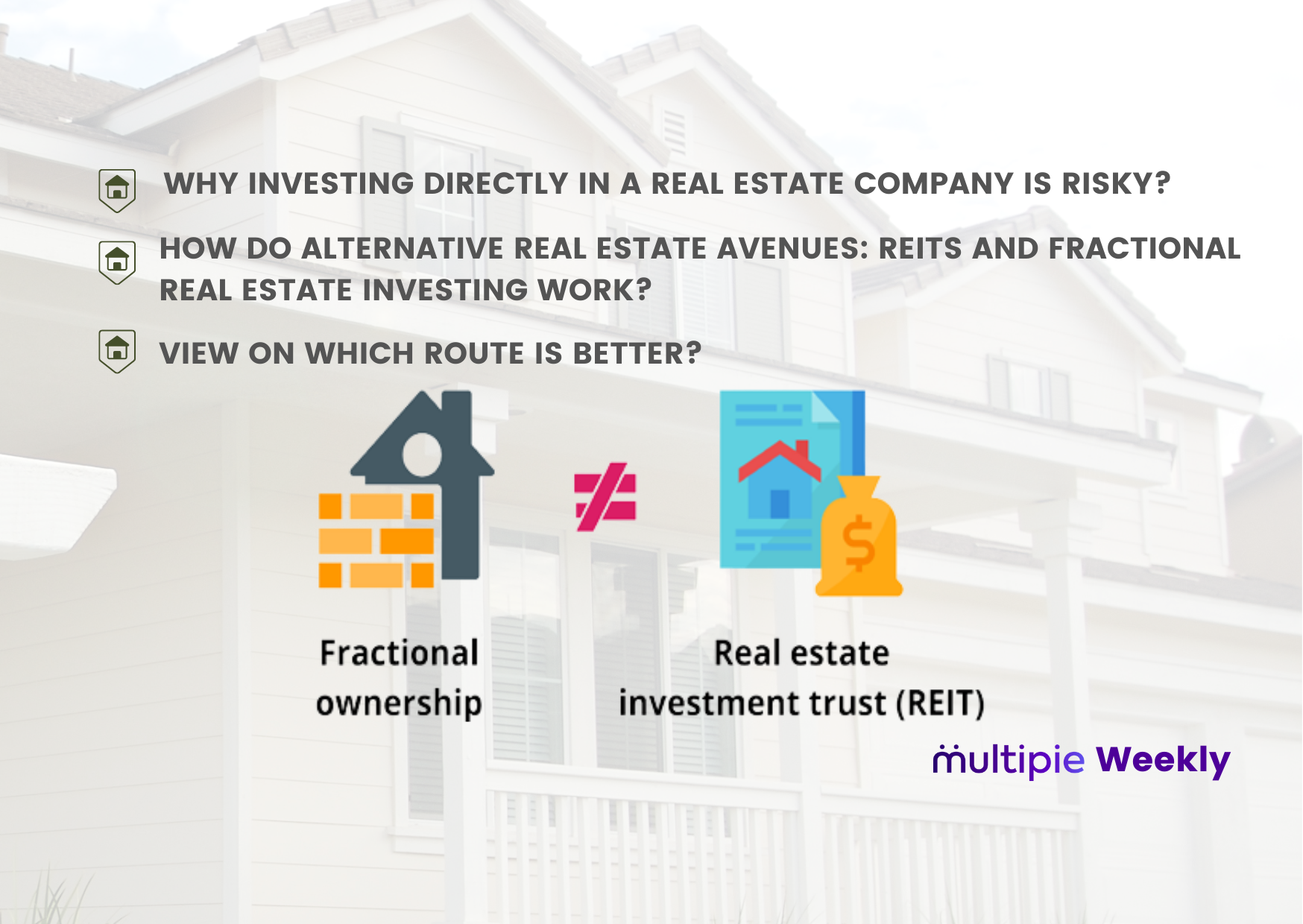This week I explain how to make most of the real estate upcycle followed by what’s trending in markets and curated good reads.
Outline
1. How to make most of the real estate upcycle? 🏠
Chinese banks are struggling as homebuyers (across 25 cities) have refused to pay their mortgages back due to project delays & fall in real estate prices. It may lead to bad debts worth $83 bn for Chinese banks.
This indicates how uncertain the situation can get for the parties related to the real estate sector during difficult times– Yes, I am not just talking about the banks, but also about the investors owning the shares of these developer companies. So, here I will explain why directly investing in a real estate company is risky and the alternatives to make most of the real estate upcycle- REITs and Fractional real estate investing followed by our view on which route is better for retail investors.
Why investing directly in a real estate company is risky?
(i) Real estate model works like running on a treadmill, high Capex needs to be incurred to just “maintain the operations” (Projects have finite lives and thus finite cashflows. After completion, the developer needs to put in the large capital & build again).
(ii) Predicting cash flows is necessary because it drives valuations, but it is impossible to predict the cash flows for a real estate company as the developer works on many projects concurrently & project-wise details are not available to the public.
(iii) There are many other grey areas in this space as a significant % of transaction takes place in cash & also Ringfencing (using collections from good projects to fund bad ones), makes the investor’s job more difficult.
So, instead, you can take an indirect exposure to real estate by investing in ancillary industries (such as cement, building materials & paints). Direct exposure can be taken by buying a property directly but if you don’t have significant capital to invest, the alternative available options are- REITs and Fractional real estate investing.
How do alternative real estate investment routes- REITs and Fractional real estate investing work?
- REITs (Real estate investment trusts)
REITs are like the mutual funds of real estate properties. In REITS, the trust owns and manages the pool of commercial real estate properties. Then the regular rental income is passed on to the investors.
REIT investors have one advantage over the investors owning shares of real estate companies- Dividends are taxed only once in REITs (REITs pay tax before distributing to their investors but there is a tax exemption on dividends for investors- given SPV has not chosen a concessional regime). While the profits are taxable twice for a stock investor (as it is taxable for both the real estate company and the investor)
Companies providing REITs are such as- Mindspace, Brookfield, and Embassy.
Interested folks can also check out an excellent comparison of the Indian REITs by clicking here.
- Fractional real estate investing
Fractional real estate investment services are provided by different platforms and they create a special purpose vehicle (SPV). This SPV collects funds from investors equivalent to the property value and purchases & manages the property.
Every SPV investor gets equity + compulsory convertible debentures (CCDs) to the proportion of their investment.
This allows investors to partially own a specific pool of properties with other investors and a trustee is appointed to safeguard investors’ interests. The trustee provides an escrow account and a custodian.
Companies providing Fractional real estate investing are such as Strata, hBits, PropertyShare and bhive.
What is better?
- In our view, REITs are relatively better for retail investors not just because it is more liquid, diversified, organized, and requires a low minimum investment amount but also due to the better governance (as mentioned above in the table, the return in fractional investing can go to “Zero” indicating very high downside risk)
The strict SEBI regulations help in ensuring that REITs manage good quality assets which ultimately attract good quality property occupiers. The top-notch quality maintained by REITs also helps in increasing rentals and leading to further growth (Source- From an interview of Vikas Khdloya, Deputy CEO-Embassy Park REIT)
Note- If you are looking to invest, we would recommend you to do your own due diligence by comparing the past performance of yields, sector-geography exposures, occupancy rate, NAVs, etc. for the different REITs available in India (Especially among the 3 listed ones- Embassy, Mindspace, and Brookfield).

2. What else is trendin’?🤙🏻
✔️ Adani ports won the tender for the privatization of Israel’s Haifa port in partnership with its local chemical & logistics partner- Gradot group. This will help in increasing competition, reducing import prices, and shortening long wait times at Israel harbors.

✔️ India’s Forex reserves plunged by $8Bn (a 15-month+ low). This is the reason for the sharp depreciation of the Rupee (exchange rate reached ~80Rs/$). Due to high crude oil import requirements, India might face a lot of difficulties.
A lot of discussions are happening by the community on Multipie, such as a summary of solidarity’s latest quarterly letter, Q1FY23 results, and export numbers for Indian rice players. Also, a new feature- “Greed and fear” is live on Multipie’s web portal. Check it out here.
You are definitely missing out on a lot if you are not on Multipie yet. So, join the community & become a better investor 😄

3. Good reads 📚
3.1 Charlie Munger this month invested a part of his personal wealth in Australian- based Stonehouse Corporation, run by American-turned-Australian Charles Jennings. After that he gave an interview and here’s a detailed thread on the same.
3.2 Investing ideas that changed Morgan Housel’s life.
3.3 Investors must shatter echo chamber by Morningstar.
See you next week. Until then, happy investing! Join us on Multipie if you haven’t yet by downloading the app by clicking here – for ios, android & web.


